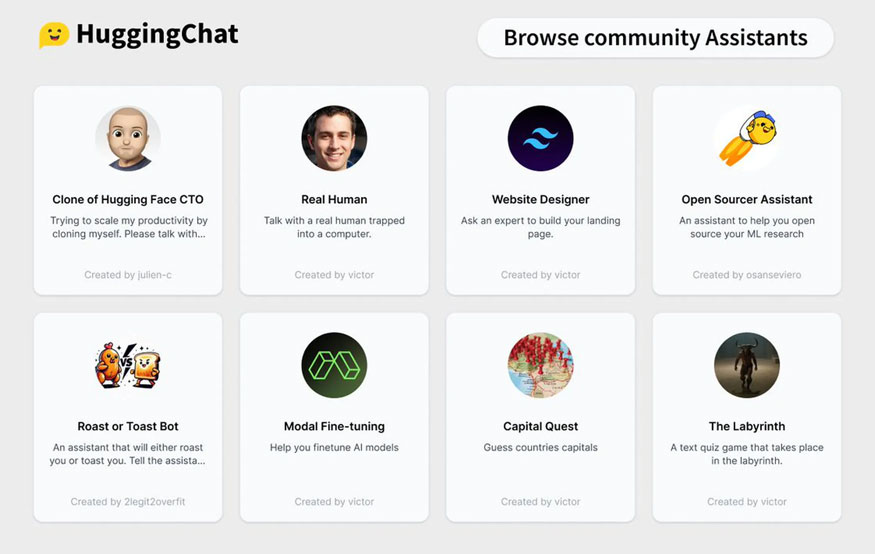AI Tools & Services: Transforming Business Operations
Hey there, tech enthusiasts and business leaders!
SORT
Learn why SEO Testing Tools is free?
SEO Testing Tools is free for users because vendors pay us when they receive web traffic and sales opportunities.
SEO Testing Tools directories list all vendors—not just those that pay us—so that you can make the best-informed purchase decision possible.
131.41K reviews
232.66K followers
- 420.33K users like this
- This launch happened 2 years ago
Claude, an advanced AI assistant from Anthropic, excels in conversational tasks and text processing. Its design prioritizes helpfulness, honesty, and safety, making it ideal for seamless integration in various business applications.
LICENSE MODEL
Freemium
PRODUCT MODEL
Proprietary
PLATFORMS
- Online
- Mac
- Windows
- Linux
- Android
- iOS
- iPhone
- iPad
Claude CATEGORIES ON SEOTESTINGTOOLS.COM
Claude FEATURES
- AI Chatbot
- AI Summarization
- AI Writing
- AI-Powered
- Chat Bot
267.88K reviews
491.93K followers
- 319.15K users like this
- This launch happened 3 years ago
Perplexity revolutionizes online search by allowing users to directly ask questions and receive precise, reliable answers backed by curated web sources, enhancing clarity and efficiency in information retrieval.
LICENSE MODEL
Freemium
PRODUCT MODEL
Proprietary
PLATFORMS
- Online
- Mac
- Windows
- Android
- iOS
- iPhone
- Google Chrome
- Linux
- iPad
Perplexity CATEGORIES ON SEOTESTINGTOOLS.COM
Perplexity FEATURES
- AI-Powered
- AI Writing
- Chat Bot
- AI Chatbot
- Ad-free
- Distraction-free
- Bots
- Dark Mode
- No registration required
- Text to Image Generation
- No Coding Required
- Privacy focused
- Cloud Sync
- Spell Checking
- Syntax Highlighting
- Lightweight
- Support for MarkDown
- Full-Text Search
- Autocompletion
- AI Summarization
97.05K reviews
339.53K followers
- 158.52K users like this
- This launch happened 2 years ago
Google Gemini offers direct access to Google AI, enhancing your productivity by assisting with writing, planning, learning, and more. Unlock smarter solutions for your business needs effortlessly.
LICENSE MODEL
Freemium
PRODUCT MODEL
Proprietary
PLATFORMS
- Online
- Android
- iOS
- Google Chrome
- Windows
- Linux
- Mac
Google Gemini CATEGORIES ON SEOTESTINGTOOLS.COM
Google Gemini FEATURES
- AI Chatbot
- AI Writing
- AI-Powered
- Ad-free
- Text to Speech
- Spell Checking
- No Coding Required
- Text to Image Generation
- Live Preview
- Lightweight
- Cloud Sync
- Dark Mode
- Marketing Automation
399.77K reviews
43.89K followers
- 44.22K users like this
- This launch happened 2 years ago
HuggingChat is an innovative, open-source alternative to ChatGPT, leveraging Hugging Face’s powerful servers. It offers customizable AI interactions, transparency, and community-driven development for enhanced usability.
LICENSE MODEL
Free
PRODUCT MODEL
Open Source
PLATFORMS
- Online
- Windows
- Mac
- Linux
- Android
- iOS
- iPhone
HuggingChat CATEGORIES ON SEOTESTINGTOOLS.COM
HuggingChat FEATURES
- AI Chatbot
- Chat Bot
- AI Writing
- AI-Powered
- Ad-free
- Privacy focused
- No Coding Required
- Dark Mode
- Marketing Automation
- No registration required
- Lightweight
193.82K reviews
176.93K followers
- 72.57K users like this
- This launch happened 5 years ago
ChatGPT, developed by OpenAI on the GPT-3 architecture, excels in generating human-like text. Its key features include versatile style adaptability and high-quality responses, enhancing user engagement and productivity.
LICENSE MODEL
Freemium
PRODUCT MODEL
Proprietary
PLATFORMS
- Mac
- Online
- iPhone
- iOS
- Android
ChatGPT CATEGORIES ON SEOTESTINGTOOLS.COM
ChatGPT FEATURES
- AI Writing
- AI Chatbot
- AI-Powered
- Chat Bot
- Web-Based
- Ad-free
- Dark Mode
- No Coding Required
- Distraction-free
- No registration required
- Text to Image Generation
Top AI Tools & Services apps of the week
Learn More About AI Tools & Services
Table of Contents
AI Tools & Services: Transforming Business Operations
Hey there, tech enthusiasts and business leaders! Are you ready to dive into the fascinating world of AI tools and services? As someone who’s spent years helping companies implement cutting-edge software solutions, I can tell you that artificial intelligence is no longer just a buzzword – it’s revolutionizing the way we do business. So, grab a cup of coffee and let’s explore how AI is reshaping enterprise software and transforming operations across industries.
The Rise of AI in Enterprise Software
Remember when AI was just a plot device in sci-fi movies? Well, those days are long gone. Today, AI is the beating heart of many enterprise software solutions, driving innovation and efficiency like never before. But what’s behind this meteoric rise?
Key Benefits of AI-Powered Solutions
Let’s break it down, shall we? AI-powered tools are like having a supercharged brain at your disposal. They can:
- Automate repetitive tasks, freeing up your team to focus on more strategic work
- Analyze vast amounts of data in the blink of an eye, uncovering insights humans might miss
- Enhance decision-making by providing data-driven recommendations
- Improve customer experiences through personalization and predictive service
It’s like having a tireless assistant who’s always learning and improving. Pretty cool, right?
Popular AI Tools Reshaping Business Processes
Now, let’s get into the nitty-gritty of some AI tools that are making waves in the business world. Trust me, these aren’t just fancy gadgets – they’re game-changers.
Natural Language Processing (NLP) Applications
Ever wished you could have a conversation with your data? Well, NLP makes that possible. It’s the technology behind:
- Chatbots that can handle customer queries 24/7
- Sentiment analysis tools that gauge public opinion on your brand
- Voice assistants that can schedule meetings or generate reports on command
Imagine having a virtual team member who can understand and respond to human language. That’s the power of NLP.
Machine Learning for Predictive Analytics
If you’ve ever thought, “I wish I had a crystal ball for my business,” machine learning is the next best thing. It’s like having a fortune teller who’s really good at math. ML algorithms can:
- Forecast sales trends
- Predict equipment failures before they happen
- Optimize inventory levels based on demand patterns
It’s not magic – it’s data science at its finest.
Computer Vision in Quality Control
Picture this: an eagle-eyed inspector that never gets tired and can spot defects invisible to the human eye. That’s computer vision in a nutshell. It’s revolutionizing quality control by:
- Detecting product defects at lightning speed
- Ensuring consistency in manufacturing processes
- Enhancing safety protocols through real-time monitoring
It’s like giving your quality control team superpowers. Who wouldn’t want that?
Implementing AI Services: Best Practices
Alright, I know what you’re thinking: “This all sounds great, but how do I actually implement these AI services?” Don’t worry, I’ve got you covered. Let’s walk through some best practices to ensure your AI implementation is smooth sailing.
Assessing Organizational Readiness
Before you dive headfirst into AI, you need to make sure your organization is ready for the plunge. Ask yourself:
- Do we have the right infrastructure in place?
- Is our data in good shape?
- Are our teams prepared for this change?
It’s like checking if you have all the ingredients before starting to cook a gourmet meal. You don’t want to be halfway through and realize you’re missing something crucial.
Data Preparation and Integration
Here’s a little secret: AI is only as good as the data you feed it. Garbage in, garbage out, as they say. So, make sure your data is:
- Clean and consistent
- Properly labeled and structured
- Integrated across different systems
Think of it as preparing a nutritious meal for your AI – the healthier the data, the better it’ll perform.
Addressing Ethical Considerations
Now, let’s talk about the elephant in the room: ethics. As we give AI more power, we need to ensure we’re using it responsibly. Consider:
- Privacy concerns and data protection
- Potential biases in AI algorithms
- Transparency in AI decision-making processes
Remember, with great power comes great responsibility. We want AI to be a force for good, not a source of controversy.
Overcoming Challenges in AI Adoption
Let’s be real for a moment – implementing AI isn’t all sunshine and rainbows. There are hurdles to overcome, but don’t worry, they’re not insurmountable.
Skill Gaps and Training Requirements
One of the biggest challenges is the skills gap. AI is a complex field, and finding people who can work with these tools can be tough. But here’s what you can do:
- Invest in training programs for your existing staff
- Partner with universities or coding bootcamps to nurture talent
- Consider hiring AI specialists or consultants to jumpstart your initiatives
It’s like learning a new language – it takes time and practice, but the payoff is worth it.
Integration with Legacy Systems
If you’re working with older systems, integrating AI can feel like trying to fit a square peg in a round hole. But don’t despair! Here are some strategies:
- Use APIs and middleware to bridge the gap between old and new
- Consider a phased approach to modernization
- Look for AI tools specifically designed to work with legacy systems
It’s about finding the right balance between innovation and stability.
The Future of AI in Enterprise Software
As we wrap up, let’s gaze into our crystal ball (or should I say, our predictive analytics dashboard?) and imagine what the future holds for AI in enterprise software.
We’re likely to see:
- More seamless integration of AI across all business processes
- Increased personalization and adaptability in software interfaces
- The rise of explainable AI, making complex decisions more transparent
It’s an exciting time to be in tech, folks. The possibilities are endless, and we’re just scratching the surface of what AI can do for businesses.
In conclusion, AI tools and services are not just transforming business operations – they’re redefining what’s possible. From automating mundane tasks to uncovering game-changing insights, AI is becoming an indispensable ally for businesses of all sizes. As we continue to navigate this AI-powered landscape, remember that the key to success lies in thoughtful implementation, continuous learning, and a commitment to ethical practices.
So, are you ready to embrace the AI revolution in your business? The future is here, and it’s powered by artificial intelligence. Let’s make the most of it!
FAQs
-
Q: How long does it typically take to implement AI tools in an enterprise setting?
A: The implementation timeline can vary widely depending on the complexity of the tool and the readiness of the organization. Generally, a small-scale pilot project might take 3-6 months, while a full enterprise-wide implementation could take 1-2 years or more. -
Q: What kind of return on investment (ROI) can businesses expect from AI implementation?
A: ROI varies based on the specific application, but many businesses report significant gains. For example, some companies have seen 20-30% increases in productivity, while others have reported cost savings of up to 50% in certain processes. -
Q: Are there any industries that are not suitable for AI adoption?
A: While AI can benefit most industries, the level of suitability may vary. Industries with highly unpredictable or creative processes might find fewer immediate applications. However, even in these cases, AI can often support backend operations or data analysis. -
Q: How can small businesses leverage AI without breaking the bank?
A: Small businesses can start with off-the-shelf AI solutions or cloud-based services that offer pay-as-you-go models. They can also focus on specific high-impact areas rather than attempting a full-scale implementation. -
Q: What are the biggest risks associated with AI adoption in enterprise software?
A: Some key risks include data privacy breaches, algorithmic bias leading to unfair decisions, over-reliance on AI systems without human oversight, and potential job displacement. Proper planning, ethical guidelines, and ongoing monitoring can help mitigate these risks.





















